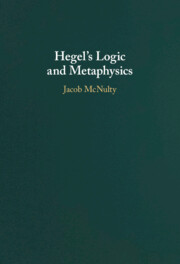Book contents
- Hegel’s Logic and Metaphysics
- Hegel’s Logic and Metaphysics
- Copyright page
- Dedication
- Contents
- Preface
- Acknowledgments
- Abbreviations
- Introduction
- Chapter 1 “Irrational Cognition of the Rational”
- Chapter 2 The Ontological Proof as “the True Critique of the Categories and of Reason”
- Chapter 3 Hegel’s Critique of “the Former Metaphysics”
- Chapter 4 Hegel’s Response to Kant’s Critique of Metaphysics
- Chapter 5 Logical Contradiction and Real Opposition
- Chapter 6 Mediated Immediacy: Concept, Judgment and Syllogism
- Chapter 7 Conclusion
- Works Cited
- Index
Chapter 4 - Hegel’s Response to Kant’s Critique of Metaphysics
Published online by Cambridge University Press: 26 April 2023
- Hegel’s Logic and Metaphysics
- Hegel’s Logic and Metaphysics
- Copyright page
- Dedication
- Contents
- Preface
- Acknowledgments
- Abbreviations
- Introduction
- Chapter 1 “Irrational Cognition of the Rational”
- Chapter 2 The Ontological Proof as “the True Critique of the Categories and of Reason”
- Chapter 3 Hegel’s Critique of “the Former Metaphysics”
- Chapter 4 Hegel’s Response to Kant’s Critique of Metaphysics
- Chapter 5 Logical Contradiction and Real Opposition
- Chapter 6 Mediated Immediacy: Concept, Judgment and Syllogism
- Chapter 7 Conclusion
- Works Cited
- Index
Summary
This chapter continues the earlier one's project of outlining Hegel's critique of metaphysics, and distinguishing it from Kant's own. It does so by considering Hegel's relationship to Kant's Transcnendental Dialectic and its three main divisions: paralogisms, antinomies and Ideal. It explains the distinction between finite and infinite categories in Hegel, as well as its bearing on his dispute with Kant. It also finishes the task, begun in Chapter 2, of reconstructing Hegel's ontological proof and response to Kant's critique of this form of argument.
- Type
- Chapter
- Information
- Hegel's Logic and Metaphysics , pp. 132 - 165Publisher: Cambridge University PressPrint publication year: 2023

